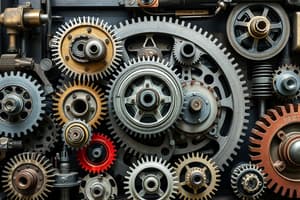Podcast
Questions and Answers
What are the four types of manufacturing processes studied at the class 10 level?
What are the four types of manufacturing processes studied at the class 10 level?
Forming processes, Joining processes, Machining processes, Additive manufacturing (3D printing)
What historical event marked a significant shift in manufacturing from agrarian societies to industrialized ones?
What historical event marked a significant shift in manufacturing from agrarian societies to industrialized ones?
The Industrial Revolution
What are some advantages of Additive manufacturing (3D printing)?
What are some advantages of Additive manufacturing (3D printing)?
Reduced material waste and flexibility in design
What are some examples of Joining processes in manufacturing?
What are some examples of Joining processes in manufacturing?
What are the key components of sustainable manufacturing practices?
What are the key components of sustainable manufacturing practices?
What does Industry 4.0 refer to?
What does Industry 4.0 refer to?
How does additive manufacturing differ from traditional methods?
How does additive manufacturing differ from traditional methods?
What is the significance of growth in service-based industries in global manufacturing?
What is the significance of growth in service-based industries in global manufacturing?
How has automation changed the face of manufacturing?
How has automation changed the face of manufacturing?
What role do cyber-physical systems (CPS) play in manufacturing?
What role do cyber-physical systems (CPS) play in manufacturing?
Study Notes
Class 10 Manufacturing Industries: Exploring Processes, Revolution, Sustainability, Trends, and Automation
Manufacturing industries, a vital pillar of global economy and innovation, have undergone radical transformations over the centuries. In this article, we'll delve into the various aspects of class 10 manufacturing industries, focusing on types of manufacturing processes, the Industrial Revolution's impact, sustainable manufacturing practices, global manufacturing trends, and automation in manufacturing.
Types of Manufacturing Processes
There are several manufacturing processes that may be studied at class 10 level. These include:
-
Forming processes: These include forging, casting, extrusion, and stamping, where raw materials are converted into finished products by shaping or pressing them.
-
Joining processes: These involve connecting pieces of materials like welding, brazing, adhesive bonding, and soldering.
-
Machining processes: These include turning, milling, and drilling, where raw materials are cut or shaped with the help of cutting tools to create precise and accurate parts.
-
Additive manufacturing (3D printing): This method builds objects layer by layer, using a digital model, offering advantages like reduced material waste and flexibility in design.
Industrial Revolution Impact
The Industrial Revolution marked a significant shift in manufacturing, transitioning from agrarian societies to industrialized ones. Key developments included steam power, mechanization, and mass production, which heralded a new era of innovation and prosperity.
Sustainable Manufacturing Practices
With the pressing need for a sustainable future, manufacturers have shifted towards eco-friendly production methods. These may include:
-
Green manufacturing: Reducing waste, water, and energy consumption, and using environmentally friendly materials in production processes.
-
Circular economy: Reusing, recycling, and repurposing waste materials in the manufacturing process.
-
Ethical manufacturing: Ensuring fair labor practices, responsible sourcing of raw materials, and respect for human rights in production processes.
Global Manufacturing Trends
Class 10 manufacturing students should be aware of the following global manufacturing trends:
-
Industry 4.0: The integration of physical production systems with digital technologies, leading to intelligent factories and autonomous production processes.
-
Additive manufacturing: This method has grown in popularity, offering advantages like reduced material waste and flexibility in design.
-
Growth of service-based industries: A shift towards service-based industries, like maintenance, repair, and operations (MRO), has grown in prominence.
-
Emerging market economies: Growing economies like India and China have gained prominence as significant players in global manufacturing.
Automation in Manufacturing
Automation has significantly changed the face of manufacturing, leading to increased efficiency, accuracy, and consistency:
-
Robotics: Robots are used in a wide range of manufacturing processes, from assembly and welding to painting and packaging.
-
Artificial intelligence (AI)/Machine learning (ML): AI and ML are used to optimize production processes, from predictive maintenance to quality control.
-
Cyber-physical systems (CPS): CPS integrate digital and physical systems, enabling greater flexibility and efficiency in production processes.
-
Internet of Things (IoT): IoT devices allow manufacturers to monitor, control, and optimize production processes remotely.
In summary, class 10 manufacturing industries cover a wide range of topics, from manufacturing processes and the Industrial Revolution to sustainable manufacturing practices and automation. Understanding these concepts is crucial for students to develop a strong foundation in manufacturing, a field that plays a critical role in our global economy and society.
Studying That Suits You
Use AI to generate personalized quizzes and flashcards to suit your learning preferences.
Description
Test your knowledge on manufacturing industries by exploring processes, the impact of the Industrial Revolution, sustainable practices, global trends, and automation. From forming processes to ethical manufacturing and Industry 4.0, this quiz covers key concepts in class 10 manufacturing industries.




